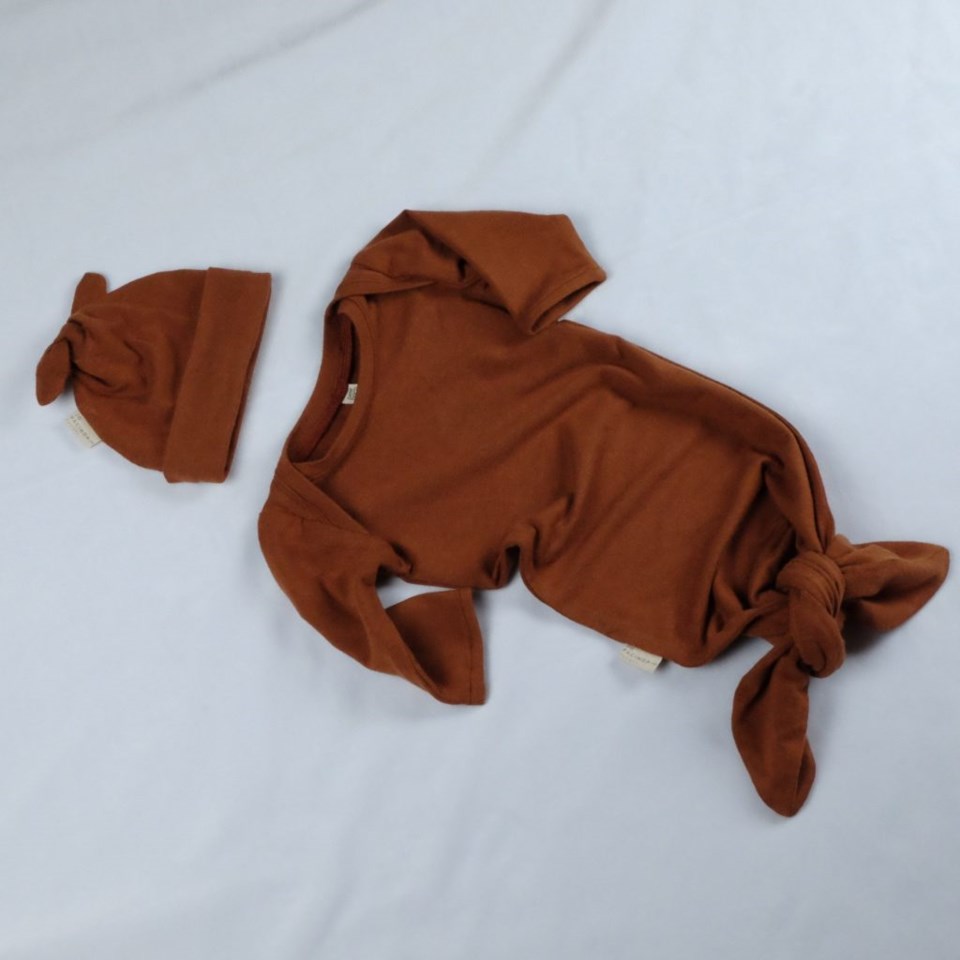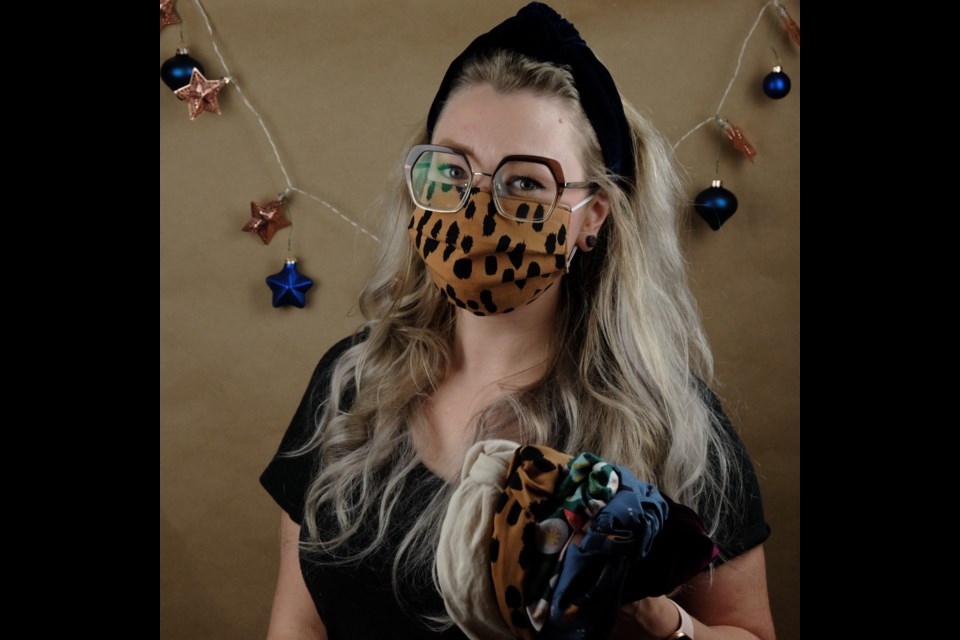Theatres are dark, but there is a bright light shining on the creativity and ingenuity of theatre people whose livelihood has been put on hold during the pandemic.
This recent development is an online umbrella website called the Backstage Bazaar, a virtual marketplace free to members of the theatre community, to showcase their art while work has dried up due to COVID-19.
It has been organized locally by Shaw backstage employee Truly Carmichael, with Erin Slattery-Black, a New York City friend and colleague — they both studied costume technology for master’s degrees — and links online shops of actors, designers, directors, stage managers and technicians from the global theatre community, including several from the Shaw Festival.
Once Carmichael and Slattery-Black decided what they wanted to do, they worked quickly to have the website up and running in time for Christmas shopping.
It was designed so each artist would have their own individual store, receiving 100 per cent of the sales, with no fees or commission to the website co-founders.
Carmichael is a Shaw backstage employee who would, in better times, be working as a liaison between costume designers and the team of stitchers she supervises. She is also a cutter and tailor, mainly dressing men cast in Shaw plays, she says, “whether they’re wearing dresses or three-piece suits,” and occasionally tackling costumes for women acting in men’s roles, such as some of the soldiers in Prince Caspian, intended for the 2020 season.
Once the season was put on hold, she and other backstage employees transitioned to making gowns for local doctors, who were still seeing patients but were short of personal protective equipment.
When they had completed 1,200 gowns, the sewers began making masks, and Carmichael began using her technical background on audio and visual editing of the digital content the Shaw was producing.
But as it became clear there was not going to be a 2020 season, and many theatre people had lost not only their full-time job but whatever their back-up work was as well, Carmichael transitioned once again, to find a way to help them put food on their tables.
“I don’t know too many people in theatre who don’t have at least one other career,” she says. “It’s just the nature of the beast. Typically a good solid contract is nine months, and for the other three months of the year, we have to do something else. I was more prepared than many, able to rely on my technical writing job and online sales.”
But many artists move from one theatre to another, she says, and instead, this year, moved to an Etsy store, selling masks, wall art, pillow covers, and other crafts that creative people turn to.
“But they’re not Etsy professionals, they’re theatre professionals,” she says.
“People are floundering, they’re moving back home, not able to keep their apartments, and making amazing things. We just wanted to find a way to gather them all under one umbrella.”
Once they decided how to proceed, “it happened almost over night,” says Carmichael.
She says she and Slattery-Black “joke that our degree is actually figuring things out and getting things done, with no budget and no time.”
They put out on social media what they intended to do, and quickly had friends volunteering to help, including Ben Deschamps, an “underemployed” musician with expertise in developing complex websites. He was able to create something people could voluntarily join, adding their individual information in a way that’s easily searchable — and he did it on an “insufficient budget, basically building it for free, and getting it up and working in two weeks.”
They also had the support of Laura Hughes, senior communications manager at the Shaw, who came on board, reaching out to two social media students who helped to get the word out.
“We thought we’d get maybe 25, 50 people,” says Carmichael. By Saturday, they were up to 125 vendors, “and it’s growing every day.”
Since it’s online, geography doesn’t matter. There is a theatre guy in the UK, a young student from Peru who is going to school in New York, and another who is based in Jerusalem. “These days, the world has no borders,” she says.
“For as long as there are people who have the perfect shop, we will keep adding to it,” says Carmichael, adding she will likely keep it going, even after theatre resumes, to help those who have “cobbled together a piecemeal living, between several different endeavours. There are never enough theatre jobs.”
Carmichael describes Jo Pacinda, a young member of the Shaw, as “a prime example of who we are trying to boost.”
Pacinda was thrilled to be working in costume design, before suddenly finding herself out of work.
“Design has been a dream of mine since I was little,” says Pacinda, a NOTL resident. “I’ve always loved fashion and design.” The website has become a creative outlet for her while theatres were closed. “I started with face masks as a way to keep others safe. For every 10 masks I sold, I made five scrub caps for the local St. Catharines hospital.”


She added baby clothes to her site after a number of friends and family had babies, she says, and hair accessories for the holidays, as perfect stocking stuffers.
“Since joining Backstage Bazaar I’ve seen traffic to my website increase. It’s a fantastic way for highly-skilled artists to share their passion and side projects,” says Pacinda. “During these difficult times it’s so important to be able to support small and independent businesses.”
Tara Rosling is another local artist and entrepreneur who has joined the Backstage Bazaar. After 11 seasons with the Shaw, she opened her Little Green Shop, all eco-friendly, locally-sourced, “wonderful things” for the home and body that will also make perfect stocking stuffers, says Carmichael.
Judith Bowden offers unique home goods, under the name Sorrel and Stitchwort, including plant prints and contact dyed containers, from plants found in the Niagara Region.
The Shaw costume and set designer says she has been fortunate — although almost all her theatre design work was put on hold, her partner is still working, “and Shaw was very helpful in how they honoured designer contracts for a cancelled season.”
She has high praise for the Backstage Bazaar.
“As designers, the effects of this year will continue for quite a while. Many theatres, when they are able to restart, will have a number of productions already designed and some fully completed and sitting on stages around the country. They will not need designers for full contracts for a while.”
This will affect staff behind the scenes as well, she says, “so finding other creative outlets is so vital.” The online platform provides a centralized place for work to be seen, but “it also has a maybe more important function. We are all linked to theatres across North America and are all linked to each other, in that we are all telling stories with our skills in those spaces.”
Designer Sim Suzer worked with Bowden on Holiday Inn at the Shaw, and has now moved to her online business, the Hands of Sim, making custom pillows.
“I am very happy to be a part of the Backstage Bazaar website,” says Suzer. “It’s a great platform to have all of the theatre people together, and it’s amazing how talented everyone is. In hard times like these, we have to stay together as a community and support each other. I think this website is a great example of that.”
Krystal Kiran is a member of the Shaw acting ensemble, teaches yoga, and is a choreographer and a dancer. None of those things are happening now, so income from her store “has become a bigger piece of her puzzle,” says Carmichael.
Kiran has lived in NOTL and India, and is now in B.C.
“The creation of Backstage Bazaar is, I believe, a brilliant idea,” she says.
As a theatre artist, performer, and owner of the bohemian Indian clothing line, House of Kiran, she says, the online site “has created a platform and community for all who have been building our businesses in isolation this year. All of my products come from India, and are my own cross-cultural, East-West take on Indian fabrics and designs. They are sustainable fashion, ethically sourced, and the majority of my pieces are one-of-a-kind.”
In her first season as an actor at the Shaw, she says, her collection of shawls was the second-top selling item at the Shaw Festival Gift Shawp (after Stephen Fry’s signed book). “I liked to call it the Shawl Festival.”
“In a way,” she adds, the pandemic has been “a blessing in disguise for my business because it has made my products available to more people, but I must say there is nothing like being with other humans.”
Knowing that a community of other artisans and small business owners in the theatre world exists “is both a relief and inspiring,” she says, “especially in these times when small businesses need more support than ever. It also makes me excited for the possibilities of us gathering in person, and maybe having a fair or festival when circumstances allow.”
Kiran says she is very grateful to be part of this theatre community. “I can’t wait to see what 2021 holds for us all. Thank you, Truly.”
To check out the website and the artists’ stores, visit https://backstagebazaar.com
